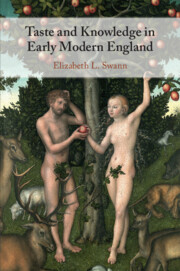Book contents
- Taste and Knowledge in Early Modern England
- Taste and Knowledge in Early Modern England
- Copyright page
- Dedication
- Contents
- Figures
- Acknowledgements
- Note on the Text
- Introduction
- Chapter 1 ‘To dream to eat Books’
- Chapter 2 Anatomizing Taste
- Chapter 3 From Eve’s Apple to the Bread of Life
- Chapter 4 ‘Those Fruits of Natural knowledge’
- Chapter 5 ‘Honey secrets’
- Afterword
- Bibliography
- Index
Afterword
‘The way to know’
Published online by Cambridge University Press: 08 October 2020
- Taste and Knowledge in Early Modern England
- Taste and Knowledge in Early Modern England
- Copyright page
- Dedication
- Contents
- Figures
- Acknowledgements
- Note on the Text
- Introduction
- Chapter 1 ‘To dream to eat Books’
- Chapter 2 Anatomizing Taste
- Chapter 3 From Eve’s Apple to the Bread of Life
- Chapter 4 ‘Those Fruits of Natural knowledge’
- Chapter 5 ‘Honey secrets’
- Afterword
- Bibliography
- Index
Summary
Addison’s article (from classical Latin articulus: joint, point of time, critical moment) forms a hinge between the early modern sense (in both ‘senses’) of taste and later ideas about aesthetics and commerce. On the one hand, as Addison proclaims, the subject of his paper is ‘Mental Taste’, rather than ‘Sensitive Taste’, and the relation between the two terms is clearly defined as metaphorical. In this regard, Addison’s words seem to bolster the critical narrative, discussed in the Introduction to this book, which describes an eighteenth-century endeavour to suppress taste’s associations with physical appetite and pleasure in favour of emphasising its associations with mental discrimination and aesthetic judgement. On the other hand, however, Addison highlights the ‘great conformity’ between mental and physical taste: the metaphor, it seems, is grounded in a very real correspondence. In Addison’s assertion that the ‘intellectual Faculty’ includes ‘as many Degrees of Refinement’ as the physical sense, moreover, the latter emerges as the standard of discrimination to which the former must aspire. Even as the cultural emphasis shifts, then, from the ‘Sensitive’ to the ‘Mental’, taste is not entirely disembodied.
- Type
- Chapter
- Information
- Taste and Knowledge in Early Modern England , pp. 223 - 225Publisher: Cambridge University PressPrint publication year: 2020

